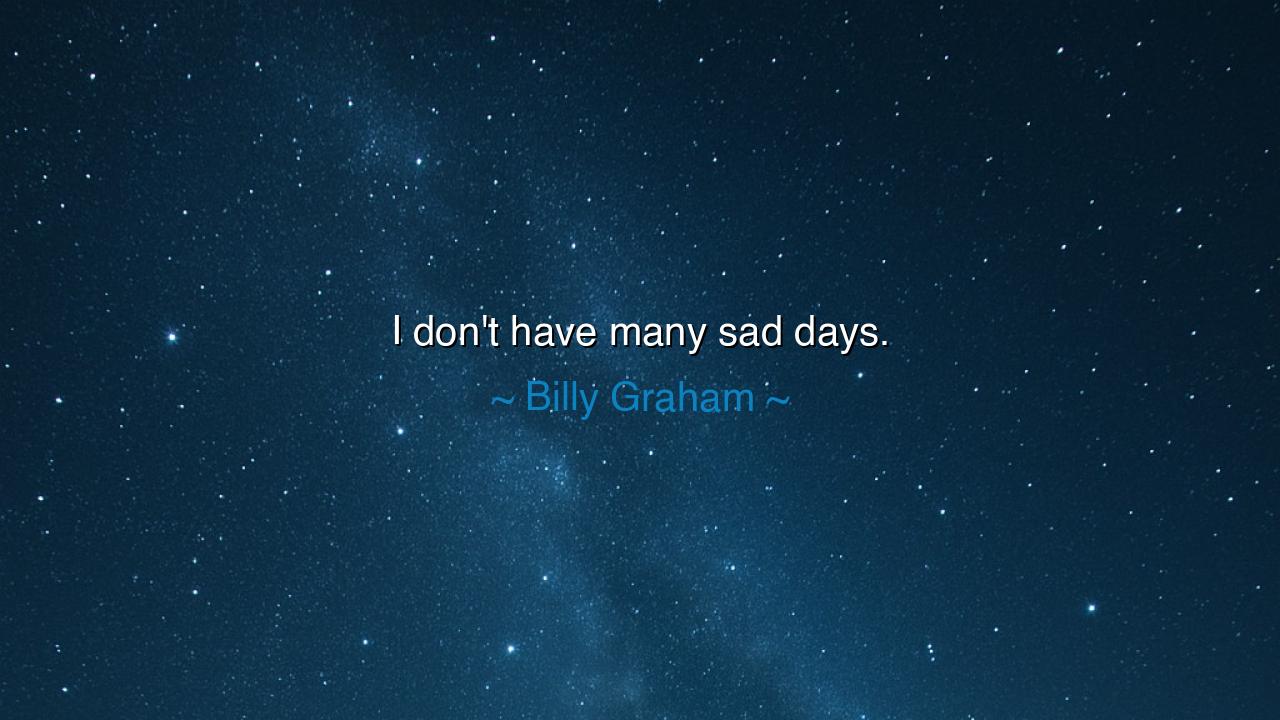
I don't have many sad days.






Hear the words of Billy Graham, the preacher who walked among kings and shepherds alike, yet spoke with the simplicity of faith: “I don’t have many sad days.” At first, these words seem light, almost casual, but within them lies the deep strength of a soul anchored not in fortune nor circumstance, but in faith and hope. To live without many days of sadness is not to escape suffering, but to possess a vision so clear that sorrow cannot linger long.
The heart of this saying lies in the perspective of faith. Graham, a man devoted to his belief in God, found that despair was fleeting because he looked beyond the troubles of the present. For him, life was not a random path, but a journey held in the hands of the Eternal. In such a view, loss becomes temporary, pain becomes meaningful, and sorrow, though it visits, cannot take permanent root. Thus, his lack of sad days was not naïveté, but the fruit of trust in something greater than himself.
The ancients, too, bore witness to this power. The philosopher Epictetus, though born a slave and crippled, declared that no man could steal his peace, for true freedom lived in the mind aligned with virtue. Likewise, the Psalmist wrote, “Weeping may endure for a night, but joy comes in the morning.” Across time and tradition, the same truth resounds: grief may strike, but those who anchor themselves in hope will not be undone by it.
Consider the life of Nelson Mandela, who spent twenty-seven years in prison, yet emerged not broken but radiant with forgiveness. He endured countless days that others would call hopeless, but his vision for justice and reconciliation shielded him from despair. In his spirit, as in Graham’s, we see the meaning of the quote: sad days may come, but they do not reign over a life filled with purpose, conviction, and hope.
This does not mean that suffering vanishes. Graham himself saw war, poverty, injustice, and death. He knew human weakness and personal loss. But his words remind us that sadness is not the same as defeat. One may grieve, yet still hold peace; one may mourn, yet still walk in light. To say, “I don’t have many sad days,” is to declare mastery not over fate, but over the spirit’s response to fate.
The lesson for us is clear: we cannot control all that happens, but we can choose the lens through which we see it. If we dwell only on loss, life will be filled with sorrow. But if we cultivate gratitude, hope, and trust, then even amidst hardship, joy will find a place. The challenge is not to banish sadness, but to prevent it from becoming the master of our days.
Practical wisdom calls to us: begin each morning with gratitude, naming even the smallest gifts. When sadness comes, let it speak—but do not let it stay unchallenged. Anchor your heart in faith, or in principles greater than circumstance. Serve others, for in lifting another’s burden, your own grows lighter. And remember always that sadness, like night, passes—while joy, like the sun, rises again.
Thus, the words of Billy Graham shine not as denial of sorrow, but as testimony of endurance: “I don’t have many sad days.” May we take this as a call to build lives anchored in hope, so that though storms may come, the days of despair remain few, and the light of peace reigns more often in the landscape of our hearts.






AAdministratorAdministrator
Welcome, honored guests. Please leave a comment, we will respond soon